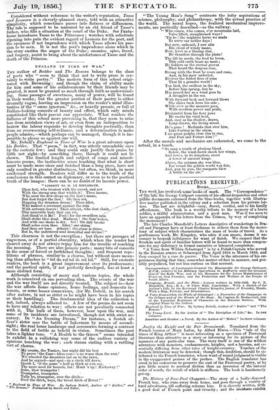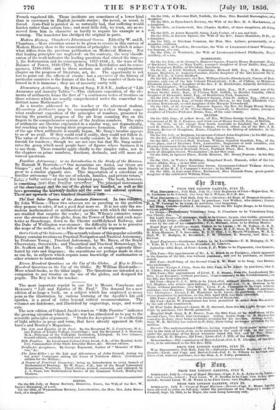PUBLICATrONS RECEIVU, --
Boozs.
THE week hr naskeleargoiefiriars-of mark. The " Correspondence " of th Sir George Cathcart consists of his official despatches and other
lie documents exhumed from the blue-books, together with illustra- tive matter published in the colony and a selection from his private let- ters. The last are delightful—easy, fluent, cordial, and to his family affectionate. The book is a worthy tribute to the memory of a brave soldier, a skilful administrator, and a good man. Was it too soon to have an appendix of his letters from the Crimea, by way of completing the monument ?
The late Charles Mansfield's Letters descriptive of wanderings in Bta- zil and Paraguay have at least freshness to relieve them from the mono- tony of subject which characterizes the mass of books of travel. As a posthumous work, Mr. Kingsley, who edits it con amore deems it ne- cessary to bespeak indulgence for want of finish. We ;aspect that the freedom and spirit of familiar letters will be found to more than compen- sate for any deficiency in formal narrative or laboured completion. "A Voice from Within Sebastopol" is by a Polish Captain who served in the Russian armies at Sebastopol from April 1854 to March 1865, and then escaped by a ruse de guerre. The Voice is the utterance of his ex* penances during that time, somewhat matter-of-fact in manner, and pos- sibly prejudiced, but not less curious on that account.
Correspondence of Lieutenant-General the Honourable Sir George Cathcart, K.C.S., relative to his Military Operations in Haffraria until the termina- tion of the Kafir War, and to his Measures for the future Maintenance of Peace on that Frontier, and the Protection and Welfare of the People of South Africa.
Paraguay, Brazil. and the Plate : Letters written in 1852-1853. By C. B. Mansfield, Esq., M.A., of Clare Hall, Cambridge. With a Sketch of the Author's Life, by the Reverend Charles Kingsley Junior, of Eversley, Haas. With a Map. Portrait, and Illustrations.
A Yoke from within the Walls of Sebastopol : a Narrative of the Campaign in the Crimea and of the Events of the Siege. By Captain R. Hodasevich, late of the Taroutine Regiment of Chasseurs in the Russian Service. With original Plans by the Author. England in Time of War. By Sydney Dobell, Author of" Balder" and "The Roman."
The Young Lord. By the Author of" The Discipline of Life," /be. In two volumes.
Sunshine and Shadow : a .NoveL By the Author of" Mabel." In three volumes .Taufry the Knight and the Fair Brutudsende. Translated from the French version of Mary Lafon, by Alfred Elwes.—This "tale of the times of King Arthur" is more interesting as a specimen of Provencal literature than attractive as a story or informing for its picture of the manners of any particular time. The story itself is one of the wildest adventure with monsters, enchantments, knights, and a heroine, not es- sentially differing from other tales of knight-errantry. Touches of the modern litterateur may be detected; through this, doubtless, should be at- tributed to the French translator, whose want of sound judgment is visible in the exaggerated praises of the preface. The English translator has erred in his endeavour to preserve the east of the Provencal poetry, as he gets little nearer to poetical diction than an inversion of the natural order of words, the result of which is stiffness. The book is handsomely got-up.
The History of lean-Paul Choppart.—The story of a badly-disposed French boy, who runs away from home, and goes through a variety. of hard adventures, till suffering reforms him. It is cleverly written, with a good deal of French point and vivacity; and the incidents exhibit
French vagabond life. Those incidents are sometimes of a lower kind than is customary in English juvenile stories ; the moral, as usual, is forced. Jean-Paul is painted as so naturally bad, that suffering would harden rather than reform him; and most little folk, we trust, are so re- moved from him in character as hardly to require his example as a warning. The translator has abridged the original in parts.
Modern History. Chambers's Educational Course. Edited by W. and R. Chambers.—More attention seems to be given to events in this survey of Modern History than to the enunciation of principles ; in which it some- what differs from the previous publication on Mecliceval History. Not that leading principles are neglected : on the contrary, the very classifi- cation of the work indicates the leading questions that stirred the time,- 1, the Reformation and its consequences, 1517-1648; 2, the wars of the Balance of Power, 1648-1789; 3, the French Revolution and its conse- quences, 1788-1855: and to these sections are added a supplementary chapter on the progress of literature, art, Scc. The opportunity is not lost to point out the effects of events : but a narrative of the history of particular countries is the feature of the book. The number of facts em- braced in it is immense ; they are of necessity curtly told.
Elementary Arithmetic. By Edward Sang, F.R.S.E., Author of "Life Assurance and Annuity Tables."—This elaborate exposition of the ele- ments of arithmetic forms the first of "a continuous series of treatises on those sciences which are usually comprehended under the somewhat in- distinct name Mathematics."
As a treatise addressed to the teacher or the advanced student, Elementary Arithmetic may be recommended as a clear though some- what exuberant exposition of the principles of numbers, presented by tracing the practical progress of the art from counting five on the fingers to the comprehensive system of the Arabian numbers. The rules of arithmetic are likewise expounded in a similar way, not dogmatically, but reaching rules by tracing their progressive formation. For children of the age when arithmetic is usually begun, Mr. Sang's treatise appears to us of no avail. If they could read it easily, they could not follow it. The value of Elementary Arithmetic really consists in the hints it may furnish for teachers ; though we are not sure but that Mr. Sang under- rates the grasp which most people have of figures whose business it is to use them. These remarks apply chiefly to the simpler rules, not to the chapters on prime numbers, fractions, decimals, and still more ad- vanced questions.
Familiar Astronomy; or an Introduction to the Study of the Heavens. By Hannah M. Bouverie.—" Our mountains are Andes, our rivers are Ganges " ; and the school-books of the Great Republic seem likely to grow to a similar gigantic size. This importation of a catechism on familiar astronomy "for the use of schools, families, and private tutors," bulky octavo of nearly five hundred pages. The book, however, is something Irxrethsz. RmAlittr 1.9torknv The.principal instruments of the observatory' mid the use of the globe's are handled, as well as tile laws governing the heaWerkdies...and the solar and sidereal systems. There are upwards of two hundred illustr-a-flv-e.---- The. Lost Solar System of the Ancients Discovered, In two vo
By John Wilson.—These two octavoes are as puzzling as the problem they propose to solve, if not a good deal more so. It is not only the nu- merous mathematical or arithmetical questions with which the volumes are studded that surprise the reader; or Mr. Wilson's extensive range over the structures of the globe, from the Tower of Babel and such mys- teries as Stonehenge, down to the Chester anclHolyhead Railway, and the Duke of Wellington war-steamer: the difficulty to us is to perceive the scope of the author, or to follow the march of his argument.
On's Circle ofthe Sciences.—The seventh volume of this popular scientific library contains treatises on Practical Navigation and Nautical Astronomy, by Professor Young ; Practical Astronomy, by Mr. Breen of the Royal Observatory, Greenwich; and Theoretical and Practical Meteorology, by Dr. Scoffem and Mr. Low. The collection is, as usual, copiously illus- trated by cuts and diagrams ; the expositions are perhaps made as clear as can be in subjects which require some knowledge of mathematics or other sciences to understand.
Eleven Hundred Questions on the Use of the Globes. A Key to Eleven Hundred Questions on the Use of the Globes. By William Hardcastle.- Mere school-books, as the titles imply. The Questions are intended as a companion to any treatise on the use of the globes, and designed for pupils. The Key is for the teacher.
The most imPortafit reprint in , our Rif is Messrs. Conybeare and Howson's Life and ,Epistles of St.. Paul.". The demand for a new edition of so large a book, on a sUbject which has employed 'so Many pens as the illustration by various , learning of the Apostles life and epistles, is a proof of value beyond Critical receminenflation. the volumes are handsome, and illtistrated-by engravings, maps,_ and wood- cuts.
The new edition of Colonel Jacob's tracton "Rifle Practiee"-indicates the growing attention: which the late war has stimulated us to pay to the scientific principles of gunnery.. " Drafts for Acceptance" is a collection of light artibles in prose and verse, that have already appeared in
burns andand-Bentley's Magazines • The Life and Epistles of M. _Paul. By the Reverend W.: J. Conybeare, M.A., .late Fellow of Trinity College, Cambridge ; ' and the Reverend j. S. Howson, M.A., Principal of the Collegiate Institution, 'Liverpool. In two volumes. Second edition, carefully revised and corrected.
1411e Practice. By Lieutenant-Colonel John Jacob, C.B., of the Bombay Artil- lery, Cffinmandant of the .Sinde Irregular Horse, 8ze. Second edition. Braftsfir Acceptance. By George Raymond, Author Of Memoirs' of Ellis- ton,', 8re.
, The Lien-Killer,' or the Life and Adventures of Jules Gerard; during his ten years' Campaigns among the Lions of Northern Africa. (Condensed edition for the Million.) - A CourseOf Practical Geometry; being an Introduction to every branch of Mathematical Drawing. By W. Pease, Cit., late of the Royal Laboratedy Department, Woolwich. Third edition, revised, corrected, and enlarged, by J. A. Pease, late Mathematical Master of the Grammar School, He eyon7 Thames.



























 Previous page
Previous page